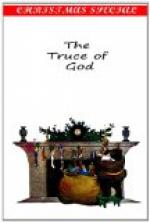Such was the Lady Margaret at the time of the battle of Elster. She frequently reverted to the challenge she had given the assailants of Stramen Castle, and detected in that defiance a relic of her former pride. It was the last spark.
She was now in daily expectation of her father and brother, and of one almost equally dear—Father Omehr. Her walks were confined to a large room adjoining her chamber, and thence along the corridor to the chapel. Her evening exercise was to walk, supported by the Countess of Montfort, to the altar of the Blessed Virgin, and observe the custom of her earliest youth, by leaving there a bunch of flowers. She spent most of the day in a cushioned chair—she was too weak to kneel long. She loved to sit in the sunlight, holding the countess’s hand in her own attenuated fingers. Then she would speak of her father and brother, and say that on the morrow they would surely be reunited. She never mentioned sickness or pain; she saw her companion’s tears falling fast at times, but she would only wipe them away with a smile and an embrace. As the sunbeams played upon her wasted features, fringing her hair with gold, and encircling her with a brilliant halo, the countess would turn away from the lovely vision to hide her emotion, and whisper to herself: “This is a glimpse of the world beyond the grave!”
CHAPTER X
We need not mourn for thee, here laid
to rest;
Earth is thy bed, and not thy grave; the
skies
Are for thy soul the cradle and the nest.
There live!
TASSO.
Toward the close of November, on one of those bright warm days, when winter, as if in memory of the departed summer, puts by his blasts and snows, the Countess of Montfort was seated at the bedside of the Lady Margaret. The countess, though in the bloom of health and youth, was sad and tearful. The maiden, though her breath was short and difficult, wore a smile upon her lips. The shadow of death was on her sunken temples, and had touched her quivering nostril and waxen ear, through which the light came as through porcelain. Yet the eyes were closed, and the pale lips moved, and the wasted hands, embracing a crucifix, were joined in prayer. She could still beg God to heal the feud. How edifying, how beautiful, how sublime the spectacle!—sublimer than the deeds of heroes, the conceptions of poets, the aspirations of genius. What is Archimedes moving the world to the humblest Christian moving heaven by prayer!




